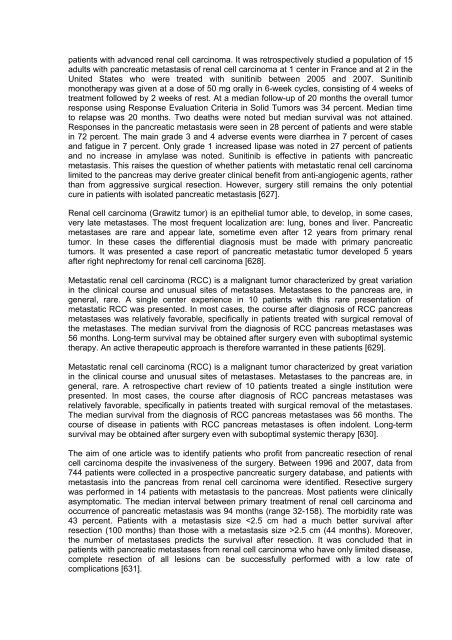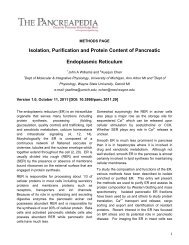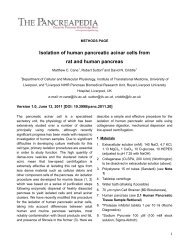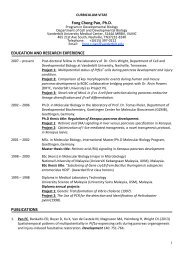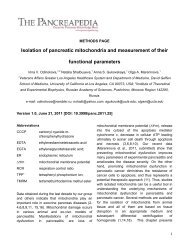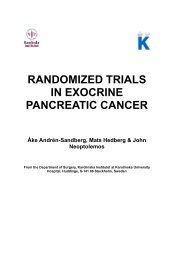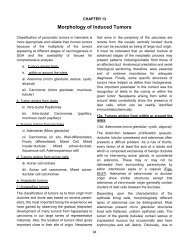review of literature on clinical pancreatology - The Pancreapedia
review of literature on clinical pancreatology - The Pancreapedia
review of literature on clinical pancreatology - The Pancreapedia
You also want an ePaper? Increase the reach of your titles
YUMPU automatically turns print PDFs into web optimized ePapers that Google loves.
patients with advanced renal cell carcinoma. It was retrospectively studied a populati<strong>on</strong> <str<strong>on</strong>g>of</str<strong>on</strong>g> 15adults with pancreatic metastasis <str<strong>on</strong>g>of</str<strong>on</strong>g> renal cell carcinoma at 1 center in France and at 2 in theUnited States who were treated with sunitinib between 2005 and 2007. Sunitinibm<strong>on</strong>otherapy was given at a dose <str<strong>on</strong>g>of</str<strong>on</strong>g> 50 mg orally in 6-week cycles, c<strong>on</strong>sisting <str<strong>on</strong>g>of</str<strong>on</strong>g> 4 weeks <str<strong>on</strong>g>of</str<strong>on</strong>g>treatment followed by 2 weeks <str<strong>on</strong>g>of</str<strong>on</strong>g> rest. At a median follow-up <str<strong>on</strong>g>of</str<strong>on</strong>g> 20 m<strong>on</strong>ths the overall tumorresp<strong>on</strong>se using Resp<strong>on</strong>se Evaluati<strong>on</strong> Criteria in Solid Tumors was 34 percent. Median timeto relapse was 20 m<strong>on</strong>ths. Two deaths were noted but median survival was not attained.Resp<strong>on</strong>ses in the pancreatic metastasis were seen in 28 percent <str<strong>on</strong>g>of</str<strong>on</strong>g> patients and were stablein 72 percent. <strong>The</strong> main grade 3 and 4 adverse events were diarrhea in 7 percent <str<strong>on</strong>g>of</str<strong>on</strong>g> casesand fatigue in 7 percent. Only grade 1 increased lipase was noted in 27 percent <str<strong>on</strong>g>of</str<strong>on</strong>g> patientsand no increase in amylase was noted. Sunitinib is effective in patients with pancreaticmetastasis. This raises the questi<strong>on</strong> <str<strong>on</strong>g>of</str<strong>on</strong>g> whether patients with metastatic renal cell carcinomalimited to the pancreas may derive greater <strong>clinical</strong> benefit from anti-angiogenic agents, ratherthan from aggressive surgical resecti<strong>on</strong>. However, surgery still remains the <strong>on</strong>ly potentialcure in patients with isolated pancreatic metastasis [627].Renal cell carcinoma (Grawitz tumor) is an epithelial tumor able, to develop, in some cases,very late metastases. <strong>The</strong> most frequent localizati<strong>on</strong> are: lung, b<strong>on</strong>es and liver. Pancreaticmetastases are rare and appear late, sometime even after 12 years from primary renaltumor. In these cases the differential diagnosis must be made with primary pancreatictumors. It was presented a case report <str<strong>on</strong>g>of</str<strong>on</strong>g> pancreatic metastatic tumor developed 5 yearsafter right nephrectomy for renal cell carcinoma [628].Metastatic renal cell carcinoma (RCC) is a malignant tumor characterized by great variati<strong>on</strong>in the <strong>clinical</strong> course and unusual sites <str<strong>on</strong>g>of</str<strong>on</strong>g> metastases. Metastases to the pancreas are, ingeneral, rare. A single center experience in 10 patients with this rare presentati<strong>on</strong> <str<strong>on</strong>g>of</str<strong>on</strong>g>metastatic RCC was presented. In most cases, the course after diagnosis <str<strong>on</strong>g>of</str<strong>on</strong>g> RCC pancreasmetastases was relatively favorable, specifically in patients treated with surgical removal <str<strong>on</strong>g>of</str<strong>on</strong>g>the metastases. <strong>The</strong> median survival from the diagnosis <str<strong>on</strong>g>of</str<strong>on</strong>g> RCC pancreas metastases was56 m<strong>on</strong>ths. L<strong>on</strong>g-term survival may be obtained after surgery even with suboptimal systemictherapy. An active therapeutic approach is therefore warranted in these patients [629].Metastatic renal cell carcinoma (RCC) is a malignant tumor characterized by great variati<strong>on</strong>in the <strong>clinical</strong> course and unusual sites <str<strong>on</strong>g>of</str<strong>on</strong>g> metastases. Metastases to the pancreas are, ingeneral, rare. A retrospective chart <str<strong>on</strong>g>review</str<strong>on</strong>g> <str<strong>on</strong>g>of</str<strong>on</strong>g> 10 patients treated a single instituti<strong>on</strong> werepresented. In most cases, the course after diagnosis <str<strong>on</strong>g>of</str<strong>on</strong>g> RCC pancreas metastases wasrelatively favorable, specifically in patients treated with surgical removal <str<strong>on</strong>g>of</str<strong>on</strong>g> the metastases.<strong>The</strong> median survival from the diagnosis <str<strong>on</strong>g>of</str<strong>on</strong>g> RCC pancreas metastases was 56 m<strong>on</strong>ths. <strong>The</strong>course <str<strong>on</strong>g>of</str<strong>on</strong>g> disease in patients with RCC pancreas metastases is <str<strong>on</strong>g>of</str<strong>on</strong>g>ten indolent. L<strong>on</strong>g-termsurvival may be obtained after surgery even with suboptimal systemic therapy [630].<strong>The</strong> aim <str<strong>on</strong>g>of</str<strong>on</strong>g> <strong>on</strong>e article was to identify patients who pr<str<strong>on</strong>g>of</str<strong>on</strong>g>it from pancreatic resecti<strong>on</strong> <str<strong>on</strong>g>of</str<strong>on</strong>g> renalcell carcinoma despite the invasiveness <str<strong>on</strong>g>of</str<strong>on</strong>g> the surgery. Between 1996 and 2007, data from744 patients were collected in a prospective pancreatic surgery database, and patients withmetastasis into the pancreas from renal cell carcinoma were identified. Resective surgerywas performed in 14 patients with metastasis to the pancreas. Most patients were <strong>clinical</strong>lyasymptomatic. <strong>The</strong> median interval between primary treatment <str<strong>on</strong>g>of</str<strong>on</strong>g> renal cell carcinoma andoccurrence <str<strong>on</strong>g>of</str<strong>on</strong>g> pancreatic metastasis was 94 m<strong>on</strong>ths (range 32-158). <strong>The</strong> morbidity rate was43 percent. Patients with a metastasis size 2.5 cm (44 m<strong>on</strong>ths). Moreover,the number <str<strong>on</strong>g>of</str<strong>on</strong>g> metastases predicts the survival after resecti<strong>on</strong>. It was c<strong>on</strong>cluded that inpatients with pancreatic metastases from renal cell carcinoma who have <strong>on</strong>ly limited disease,complete resecti<strong>on</strong> <str<strong>on</strong>g>of</str<strong>on</strong>g> all lesi<strong>on</strong>s can be successfully performed with a low rate <str<strong>on</strong>g>of</str<strong>on</strong>g>complicati<strong>on</strong>s [631].


